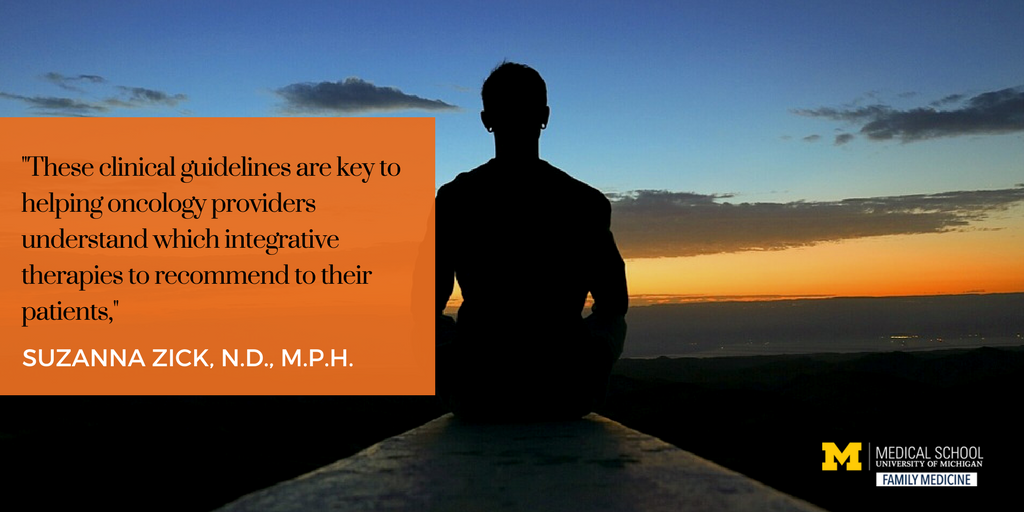
We recently announced three new research grants awarded to faculty in the Department of Family Medicine, including a five-year R25 grant from the National Cancer Institute, in support of research associate professor Suzanna M. Zick, N.D., M.P.H. and the development and implementation of a new integrative oncology training course based at the University of Michigan. At the same time, Dr. Zick has had a new paper published in CA: A Cancer Journal for Clinicians, a publication of the American Cancer Society that provides updated clinical guidelines for integrative treatments for patients with breast cancer. "These clinical guidelines are key to helping oncology providers understand which integrative therapies to recommend to their patients," said Dr. Zick, who has served as past president of the Society for Integrative Oncology (SIO), the professional organization that authored the guidelines.
Researchers at Columbia University, MD Anderson Cancer Center, University of Michigan, Memorial Sloan Kettering Cancer Center, and other institutions in the U.S. and Canada analyzed which integrative treatments are most effective and safe for patients with breast cancer. This systematic review adds to the growing literature on integrative therapies for patients with breast cancer and other cancer populations.
The researchers evaluated more than 80 different therapies and developed grades of evidence. Based on those findings, the Society for Integrative Oncology makes the following recommendations:
- Use of music therapy, meditation, stress management and yoga for anxiety and stress reduction
- Use of meditation, relaxation, yoga, massage and music therapy for depression and mood disorders
- Use of meditation and yoga to improve quality of life
- Use of acupressure and acupuncture for reducing chemotherapy-induced nausea and vomiting
- A lack of strong evidence supporting the use of ingested dietary supplements or botanical natural products as part of supportive care and/or to manage breast cancer treatment-related side effects
"Studies show that up to 80 percent of people with a history of cancer use one or more complementary and integrative therapies, but until recently, evidence supporting the use of many of these therapies had been limited," said lead author Heather Greenlee, N.D., Ph.D. "Our goal is to provide clinicians and patients with practical information and tools to make informed decisions on whether and how to use a specific integrative therapy for a specific clinical application during and after breast cancer treatment," Greenlee continues.
In their systematic evaluation of peer-reviewed randomized clinical trials, the researchers assigned letter grades to therapies based on the strength of evidence. A letter grade of "A" indicates that a specific therapy is recommended for a particular clinical indication, and there is high certainty of substantial benefit for the patient.
Meditation had the strongest evidence supporting its use, and is recommended for reducing anxiety, treating symptoms of depression, and improving quality of life, based on results from five trials. Music therapy, yoga, and massage received a B grade for the same symptoms, as well as for providing benefits to breast cancer patients. Yoga received a B grade for improving quality of life based on two recent trials. Yoga and hypnosis received a C for fatigue.
"The routine use of yoga, meditation, relaxation techniques, and passive music therapy to address common mental health concerns among patients with breast cancer is supported by high levels of evidence," said Debu Tripathy, MD, chair of Breast Oncology at The University of Texas MD Anderson Cancer Center. "Given the indication of benefit coupled with the relatively low level of risk, , these therapies can be offered as a routine part of patient care, especially when symptoms are not well controlled."

Acupressure and acupuncture received a B grade as an addition to drugs used for reducing chemotherapy-induced nausea and vomiting. In general, there was a lack of strong evidence supporting the use of ingested dietary supplements and botanical natural products as part of supportive cancer care and to manage treatment-related side effects.
"Clinicians and patients need to be cautious about using therapies that received a grade of C or D and fully understand the potential risks of not using a conventional therapy that may effectively treat cancer or help manage side effects associated with cancer treatment," warned Lynda Balneaves, RN, PhD, associate professor, College of Nursing, Rady Faculty of Health Sciences, Winnipeg, Canada.
"Patients are using many forms of integrative therapies with little or no supporting evidence and that remain understudied," noted Dr. Greenlee. "This paper serves as a call for further research to support patients and healthcare providers in making more informed decisions that achieve meaningful clinical results and avoid harm."
Browse the latest research on integrative and complementary medicine and cancer and prevention screenings



